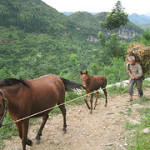Where should a country invest its money? How policymakers answer this complex question can have an impact on the welfare of their constituents—especially those living in poverty—for generations.
Pro-Poor Avian Influenza Risk Reduction Program
MOTIVATION Highly pathogenic avian influenza (HPAI) poses a major risk to human and animal health. After the disease spread in Asia (starting in 2003) and beyond, policymakers realized they lacked the information needed to choose biologically effective and economically efficient control measures that also protect the livelihoods of rural poor. The most widely practiced method >> Read more
Pro-Poor Avian Influenza Risk Reduction Program
IFPRI, in collaboration with the International Livestock Research Institute, worked in Vietnam, Thailand, Indonesia, Ethiopia, Nigeria, Kenya, and Ghana from 2007–11 to develop evidence-based responses to HPAI that consider the impact on, and effectiveness in, smallholder systems.
Rural Poor and Smallholders in Western China and Trade Liberalization
MOTIVATION China is a leading example of the opportunities global trade liberalization can offer developing countries and emerging economies. China has been a World Trade Organization (WTO) member since 2001, and while freeing up global trade has benefited the overall economy, certain groups of Chinese citizens—specifically those in low-income rural areas—have not enjoyed many of >> Read more
Water Allocation in China
MOTIVATION The Yellow River Basin is considered the “cradle of Chinese civilization,” but it has suffered severe water scarcity. The basin’s specific climatic conditions, rapid socioeconomic development, and absence of defined water rights have led to excessive water use; during the last 50 years, agricultural water use has increased by more than 250 percent and >> Read more
Understanding Rural-Urban Linkages for Development in China
IFPRI and its partners at the Center for Chinese Agricultural Policy evaluate policies that strengthen linkages to promote more equitable growth.
